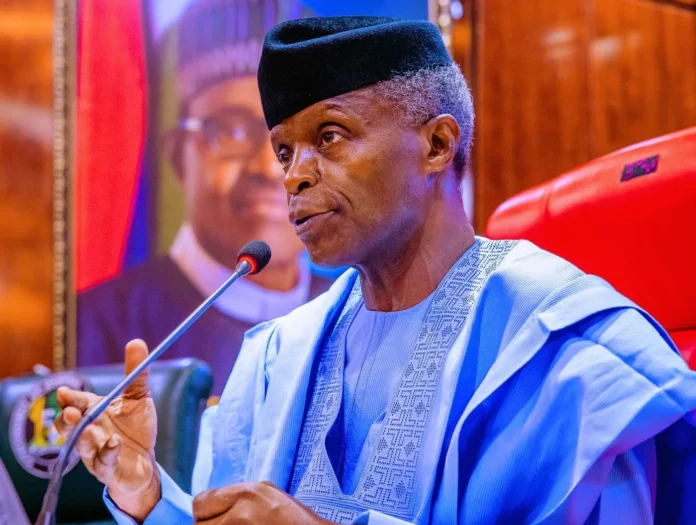Former Vice President Yemi Osinbajo recently shared an insightful experience from his visit to Washington D.C., where he was hosted by the representatives of EDS25, a group that represents African countries at the World Bank. Osinbajo’s visit, which took place during a busy period of international discussions on global development, showcased Nigeria’s active participation in key global economic conversations.
In his Instagram post on the second afternoon of his visit, Osinbajo expressed his pleasure in engaging with influential leaders and representatives from Angola, South Africa, and Nigeria, who are part of the EDS25 at the World Bank. The group, under the leadership of former Nigerian Minister of Finance, Budget, and National Planning, Zainab Ahmed, now serves as the Executive Director of the EDS25.
Osinbajo’s visit was marked by warm hospitality as he was hosted by Zainab Ahmed and her team at the World Bank. Zainab Ahmed, who has played a pivotal role in Nigeria’s financial and economic policy over the years, now holds the prestigious position of Executive Director at EDS25, representing the interests of Africa at the World Bank and IMF. Under her leadership, the EDS25 has become a key player in driving Africa’s voice in the global financial space.
In addition to Mrs. Zainab Ahmed, Osinbajo was joined by Tariye Gbadegesin, the CEO of the Climate Investment Fund, who is also an important figure in shaping investment strategies aimed at addressing climate change across the globe. Both individuals, alongside their colleagues, took the opportunity to engage in fruitful discussions with Osinbajo on issues relating to economic development, climate change, and Africa’s role in international financial institutions.
The EDS25, also known as the “25th Constituency” of the World Bank, represents the collective interests of several African countries, including Angola, South Africa, and Nigeria. This platform serves as a crucial mechanism for amplifying the voices of African nations, ensuring that the continent’s needs and perspectives are included in important decisions made by global financial institutions like the World Bank and the International Monetary Fund (IMF).
During Osinbajo’s visit, the engagement was aimed at reviewing Africa’s ongoing participation in global finance, particularly in the context of the evolving financial landscapes and climate change challenges. As a member of the EDS25 group, Nigeria continues to play a central role in influencing policy decisions and advocating for African countries’ economic and financial interests on the international stage.
Nigeria’s involvement in these global discussions, led by representatives such as Zainab Ahmed, is an important aspect of the country’s growing role in global economic matters. As one of the largest economies in Africa, Nigeria’s engagement in these international financial spaces allows the country to champion policies that prioritize sustainable development, climate finance, and economic resilience in the face of global challenges.
Osinbajo’s participation in the session with EDS25 representatives underlines the strong collaboration between Nigerian leadership and key international bodies. It also highlights the importance of fostering relationships that promote the interests of the continent, particularly when it comes to securing investment in sectors such as infrastructure, education, and climate adaptation.
A key area of discussion during the meeting was the pressing issue of climate change and its impact on Africa. Tariye Gbadegesin, as the CEO of the Climate Investment Fund, brought valuable insights into the role of international financing in addressing climate-related challenges. Africa, being one of the most vulnerable regions to climate change, requires innovative financial solutions to mitigate its effects, while simultaneously working toward sustainable economic growth.
As the world faces an increasing need for climate action, Osinbajo emphasized the importance of climate financing for African nations. In his post, he noted his satisfaction in engaging with these leaders, as they shared their experiences and perspectives on how to attract investment in green technologies and climate-resilient projects.
Through the support of international institutions like the World Bank and the IMF, African countries, including Nigeria, can tap into climate funds designed to help mitigate the impacts of environmental degradation. These funds are critical to the continent’s ability to adapt to climate change while ensuring economic development continues in an environmentally sustainable way.
Osinbajo’s visit also underscores Nigeria’s increasing global visibility, particularly within key international forums and development institutions. His interactions with representatives from various African countries further strengthen the nation’s reputation as a key player in driving economic progress and financial inclusion across the continent.
For Osinbajo, such engagements are an important opportunity to further Nigeria’s economic diplomacy, build stronger partnerships, and ensure that the country remains at the forefront of discussions on global economic policy. The Vice President’s participation in these conversations is part of a broader Nigerian strategy to foster global cooperation, attract investment, and advocate for policies that promote Africa’s development in the global economy.
Beyond climate change, Osinbajo’s engagement with the EDS25 representatives touched on other critical areas, such as infrastructure development, education, and financial inclusion. As Nigeria continues to push for sustainable economic growth, there is a clear emphasis on policies that empower the country’s population through improved access to essential services and job opportunities.
The discussions also reflected Nigeria’s continued advocacy for greater access to financial resources for development projects, with a focus on ensuring that growth benefits are shared widely across the population. This aligns with the country’s broader goal of eradicating poverty and improving living standards for its citizens.
As Osinbajo’s visit to Washington D.C. concludes, it is clear that Nigeria’s participation in global economic forums such as the World Bank and IMF remains a cornerstone of its foreign policy. The ongoing relationships between Nigerian leaders and influential figures like Zainab Ahmed, Tariye Gbadegesin, and other members of the EDS25 are crucial to securing a future of shared prosperity for Africa.

